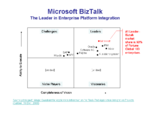Microsoft Office Applications and Data Ownership - Part II
 Thursday, February 19, 2009 at 8:47AM
Thursday, February 19, 2009 at 8:47AM The growing dominance of Microsoft's BizTalk Server offers an interesting - and very real - opportunity for accelerating the transformation of Microsoft Office Applications into SaaS-anized supply chain tools for small businesses (SMBs).
BizTalk is the leader in enterprise platform integration. Click on the thumbnail to the right to see an abridged version of the Magic Quadrant found in Magic Quadrant for Application Infrastructure for Back-End Application Integration Projects (Gartner, 19 Dec. 2008). This report is so favorable that Microsoft has licensed this publication for prominent display at Microsoft's BizTalk Server website.
Gartner says that Microsoft's leadership is directly tied to the current and forward-looking strengths of BizTalk:
- Brand recognition, global reach, mind share and huge installed base of products that are leveraged for BizTalk Server sales.
- BizTalk Server installed customer base of more than 8,000 enterprises — two-thirds are estimated to be BizTalk Server 2006 Enterprise Edition or newer.
- BizTalk Server is an identified part of two of Microsoft’s largest and most aggressive initiatives: Microsoft’s Oslo technology [a data modeling platform] and Windows Azure Services Platform [a Cloud computing platform].
But Gartner also has cautionary comments:
- Comprehensive, general-purpose metadata management (that is, business process models, component models, data models, applications, services and interface artifacts) will only become available incrementally as future versions of Microsoft’s Oslo technology and Windows Azure extend the capabilities that exist today in BizTalk.
- Currently there are no products for managing and implementing policy and life cycle management integrated with BizTalk Server.
Let's take a look at the following high-altitude slides for better understanding what Gartner is talking about vis-a-vis 'life cycle management'.
View Microsoft Office Applications and Data Ownership - Part II on ScribdAs mentioned in the slide show, integrating Pardalis' metadata business rules with BizTalk's business rules provides a head start for massively connecting 10's of millions (to say the least) of small businesses to BizTalk's enterprise business activity monitoring. The key is providing small businesses with life cycle, chain-of-custody managment of their own data products. Providing this kind of data ownership to small businesses is the path of least resistance to Ballmer's visions of integrating supply chain competitors.

